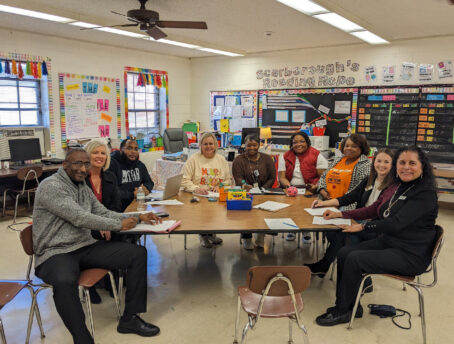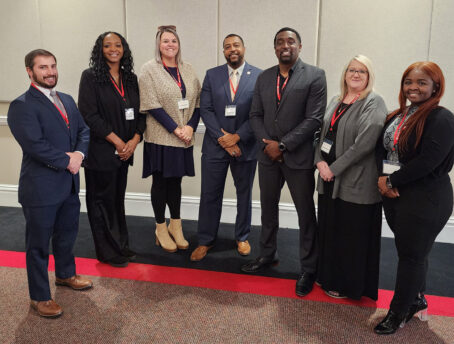Hello, and welcome to the I Am A Rural Teacher Podcast, a project of Rural Schools Collaborative and the National Rural Education Association.
Rural teachers know that their students deserve the very best, often continuing their own education so they can better serve their learners. Dr. Brandon Renfroe completed an EdD in Rural Education at the University of West Alabama, a first-of-its-kind program, before becoming a rural science teacher in Geraldine, Alabama.
Dr. Annah Rogers, RSC’s GRAD Partnership Black Belt Regional Hub Coordinator and an assistant professor at UWA, sat down with Brandon to discuss his experiences as a rural teacher and community leader.
Brandon: I think that 'rural’ has so many different connotations, depending on the context. I know for me, when I was thinking about how I would define it, I thought about the Norman Rockell paintings – you know, except in our case, in DeKalb County, you would have corn fields, cotton fields, rows and rows of corn. When I think about ‘rural,’ for me in Alabama, it’s football games on Friday nights, basketball games with the whole community there. It’s the county fair at the VFW fairgrounds.
Brandon has taught in several sizes of schools, and he emphasizes the advantages of teaching a smaller community. He is passionate about giving his rural students a fair chance at education, even when resources may be slim compared to urban districts:
Brandon: The one commonality – and it’s the most important one, in my judgment – is the kids. Students want to learn wherever they go to school. Geraldine is a 3A school classification-wise, and I’ve taught at 6A and 7A schools, and I’ve told them - and they’re always kind of surprised when I do - I tell them, ‘You guys are just as smart as any students at any school I’ve ever taught at.’ Kids are kids. They want to learn just as badly, and I said, the only difference - if there is a difference - is that sometimes kids in rural schools don’t get the same opportunities, have access to the same materials, as their urban counterparts.
Part of his work to improve his students’ school experience involved expanding his own knowledge. Brandon had already completed an EdS in teacher leadership at Jacksonville State University when he found out about the University of West Alabama’s EdD in Rural Education:
Brandon: I came into contact with Dr. Miller. Jan Miller is the Dean of the College of Education, and after speaking with her I knew that West Alabama was - that was gonna be the only place for me. That’s where I wanted to pursue my studies. And I feel like if anyone gets to know her, they’re gonna want to go to West Alabama. She’s just an incredible ambassador for all things rural, in my book.
Annah underscored the rural focus of the university and the amazing outcomes of their program:
Annah: UWA’s EdD in Rural Education is indeed the first of its kind, and we have grown exponentially since those early years, and we’re very proud of that. We have students from Alabama, but we also have students from all over the country that share a common focus on rural education. We are passionate about education, as you well know, and rural education in particular. We are proud to say that we produce more teachers in the state of Alabama than any other institution in the state. Which is saying a lot, because as you know Brandon, we are very small. We work with rural rural teachers and leaders throughout the state on a variety of grant projects, one of which is the GRAD Partnership, where in partnership with Rural Schools Collaborative and Johns Hopkins University we’ve been able to support 10 schools who are implementing high-quality student success systems throughout the Black Belt region.
Brandon also shared more about his doctoral research, which focused on food insecurity. While the researchers expected to see food insecurity throughout the state, they were surprised at the severity of the issue:
Brandon: For several years, I’ve been interested in fighting hunger. I decided to look at food insecurity in the Black Belt. Usually food insecurity is measured from a parent perspective via a survey, and it is not usually measured from an adolescent perspective. So we took that children’s food insecurity survey, and sent that to the kids in the Black Belt. And what we found was that Very Low Food Security - which is the most severe form, that’s what we’d call hunger, actually skipping meals, going without - Very Low Food Security was over 11 times higher in the Black Belt than the national average. So about one out of 10, one out of 11 we’ll say, students in the Black Belt were going without food or at least reducing their food intake to make ends meet.
Through his research, and through partnerships with other community-focused individuals, Brandon was able to find and implement solutions in different regions of Alabama:
Brandon: We’re really trying to wage a two-front battle against food insecurity. In west Alabama, we’re working with the West Alabama Food Bank. They have a really neat program that they call Secret Meals, which provides weekend food assistance for students there. According to their website, for $140, they will provide weekend food assistance for one student for an entire school year. I partnered with Miss Heather Shambry , and right now we’re helping 60 students. Now, she’s the hero there.
In north Alabama - northeast Alabama - we’re partnering with another food bank in a similar program. And to help our community, we’ve also opened a food pantry at our high school cafeteria, and we’re helping around 50 families each Saturday with that panty. So, we have an in-school food pantry Monday through Friday that we give the kids boxes that we get from the Food Bank of North Alabama, and then we open again on Saturdays. And our Saturday pantry is primarily elderly, we have a high elderly population that visits the food pantry, and also a large Hispanic contingent.
Like many rural teachers, Brandon has found that connecting with his fellow educators, his students, and his community is the most valuable part of the job:
Brandon: At the end of day, that’s what teaching’s about. Trying to be a role model, trying to be a good example. Seeing my students grow up, have careers of their own, and especially - especially - when they want to invest back in their communities, and hopefully be civic-minded and apply those lessons that we tried to teach them and we weren’t always sure if they were listening or not but maybe they heard more than we realized. It encourages me to see the next generation taking the lead, taking the reins, and so that gives us a lot of hope.
I’m thankful for the friendships, the relationships, that I’ve made. It’s because of rural schools, it’s because of West Alabama, that I was able to meet educators who are now really mentors and heroes to me. I mentioned Dr. Miller, Reenay Rogers, also B.J. Kimbrough. I’ve also been able to meet leading scholars like you, Dr. Rogers.
As part of his effort to support students’ agency in their education, Brandon held a conversation with them and discovered they had a strong interest in place-based education. Wanting to implement a project in his classroom, he discovered RSC’s Grants in Place Fellows program:
Brandon: I talked to my kids about what they had done over the previous years, and labs that they had done, and one thing that they made clear to me was that they had not been able to do a whole lot outside, in the community. They hadn’t been able to go outside the walls of the classroom. And so I promised them that some way, we would figure out a way to get into the community, do some hands-on projects there, some project-based learning.
I was fortunate, I saw from the Rural Schools Collaborative that a grant was available, and I applied for that and was fortunate to be chosen for one of those grants. And what it did was it allowed my students to do water quality testing at a national preserve - the Little River Canyon in Fort Payne - and it gave my kids an opportunity - and it was the first, really for many of them - to do real-world, hands-on research. And I don’t think they’ll ever forget that, and I’m certainly indebted to the Rural Schools Collaborative for providing us with that opportunity. We are so thankful for that.
I would be remiss if I didn’t mention Savannah Franklund. She has been a point of contact for me with the Rural Schools Collaborative, she has encouraged me to apply for grants and encouraged me to submit proposals. And so Savannah has been a huge advocate and just a great friend, really, helping us in the work that we’re doing. She’s a great encourager.
Reflecting on the vastness of rural America, Brandon shared what he believes unites each unique community in one rural identity:
Brandon: There’s a certain mindset in our country today that says, ‘I’ve worked hard for everything I’ve got,’ and they sort of tend to judge those who have less. There is a certain mindset that says if you’re in a rural place, sometimes, [you’re] maybe not as energetic, maybe not as enthusiastic, and that’s just palpably false. That’s a false narrative. I’ve seen time and and time again how hard these kids work and how very smart they are.
When you think about ‘rural’ across the country, to me the main thing suggested by rurality is closeness. It’s a sense of community. It’s a sense of family. To me, rural means that we take care of each other. That ethos that goes with a small town, we look out for one another. We don’t let anyone go without. When one person suffers, the community suffers. When one person rejoices, the community rejoices. That, to me, is rural.
My name is Brandon Renfroe, and I am a rural teacher.
Thank you for listening to this episode of the I Am A Rural Teacher Podcast. Special thanks to Annah and Brandon for sharing their perspectives and our partners at the University of West Alabama for partnering with us on this episode. The I Am A Rural Teacher Podcast is a shared project of Rural Schools Collaborative and the National Rural Education Association.




